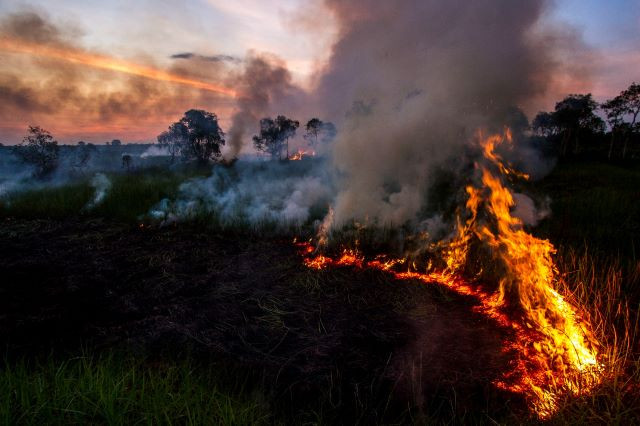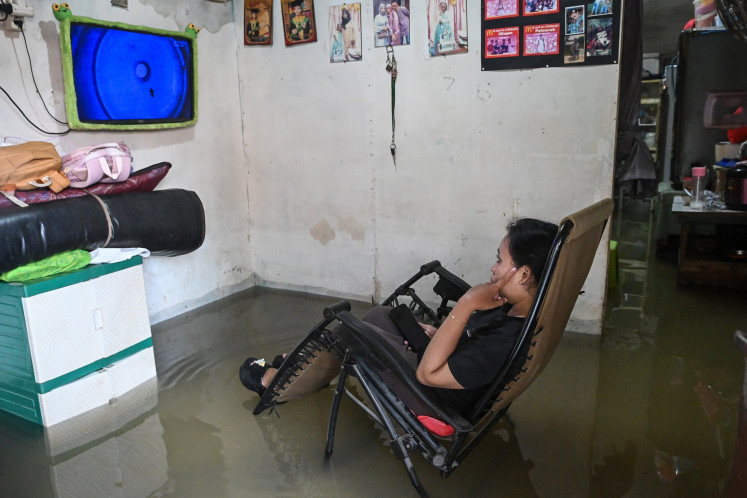Popular Reads
Top Results
Can't find what you're looking for?
View all search resultsPopular Reads
Top Results
Can't find what you're looking for?
View all search resultsBracing for 'boiling' season
Aside from the hotter dry season forecast for Indonesia this year, the government needs to prepare for the longer term of 'global boiling'.
Change text size
Gift Premium Articles
to Anyone
It is the year of more heat and less rain, more wildfires and less water. Welcome to a scorching dry season!
Yes, some regions like Jakarta are still seeing rainfall at least once a week. But don’t be fooled: those might be local anomalies. The Meteorology, Climatology and Geophysics Agency (BMKG) has forecast that we will be hitting the peak of the dry season between July and August.
This year’s dry season is not an ordinary one. It is expected to be drier, thanks to the El Niño weather phenomenon over the Pacific, which may result in an even hotter season across the archipelago. This is the first time El Niño has developed over the Pacific after three years of its colder counterpart La Niña, which brought intense rainfall across the country.
We are in the thick of it, so now is the time to brace ourselves for a more searing dry season and work to soften its blow across the country. It is also time for the government to think longer, beyond this year’s dry season, because this is just the beginning of a bigger and perhaps more devastating crisis.
Some regions have reported a water crisis, with clean water becoming a scarce resource. Villagers in Central Java and East Java as well as Papua are reportedly facing difficulty in getting clean water and having to rely on tanks of water from the authorities of neighboring regions.
It might be a matter of when, rather than if, other regions will face drought.
Kalimantan and Sumatra are already suffering from wildfires in patches. The official data even show that this year’s fires have already burned across more land in fire-prone regions than last year. South Kalimantan has seen wildfires burning through nearly 2,300 hectares, up from 429 ha confirmed last year, according to the Environment and Forestry Ministry.
The more arid dry season may also cause cross-border haze like in 2015 and 2019 if we fail to mitigate wildfires. A Singaporean think tank has issued a red alert for transborder haze, due to the risks of wildland and forest fires developing in Indonesia and Malaysia. This is the first time that the highest haze hazard rating has been issued for Southeast Asia since 2019, when fire engulfed 1.6 million ha in Indonesia.
The most frightening scenario of the coming dry season is its impact on our food. The El Niño is expected to reduce the country’s rice production by 5 percent from this year’s target, although some businesspeople might blame it on logistical challenges rather than the weather. The government has started distributing more rice, especially to the poor, but we might need another strategy in case the reserves of the State Logistics Agency (Bulog) is depleted sooner than predicted.
And this year’s dry season might just be the start of a worse future. While this might be the hottest dry season of our lives, it also might be the coldest one for the rest of our lives.
July is “extremely likely” to be the hottest month on record, according to the United Nations and European weather agencies. Even the UN Secretary-General Antonio Guterres said we had passed global warming and were entering the era of “global boiling.”
The government needs to look beyond this year. It is not only about “how can the people eat rice until the end of this year?” for example, but “how can we have enough food every year?” We need real sustainable solutions for this and not another greenwashing measure, such as food estates that might create more problems than solve existing ones by clearing forests for rice fields; which is not cool, literally.
No more excuses. It is time for us to prepare ourselves, as the boiling world is coming.











